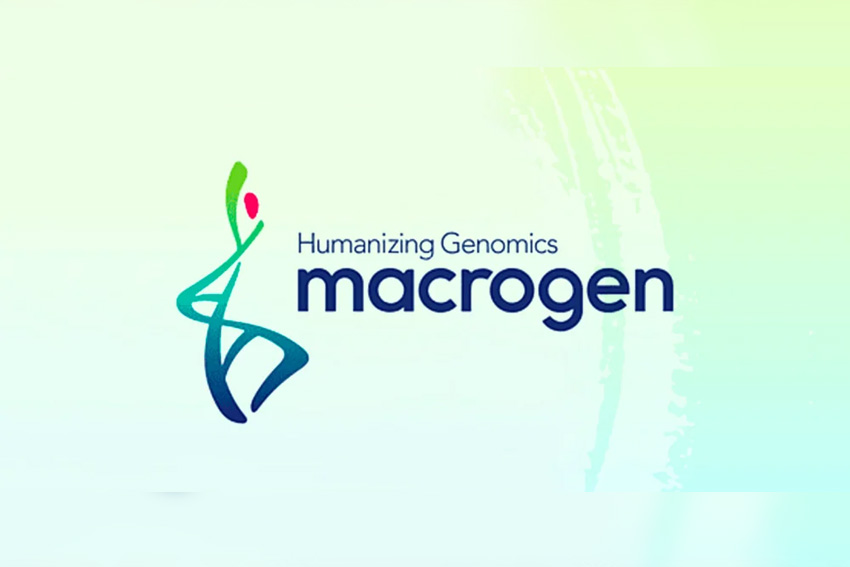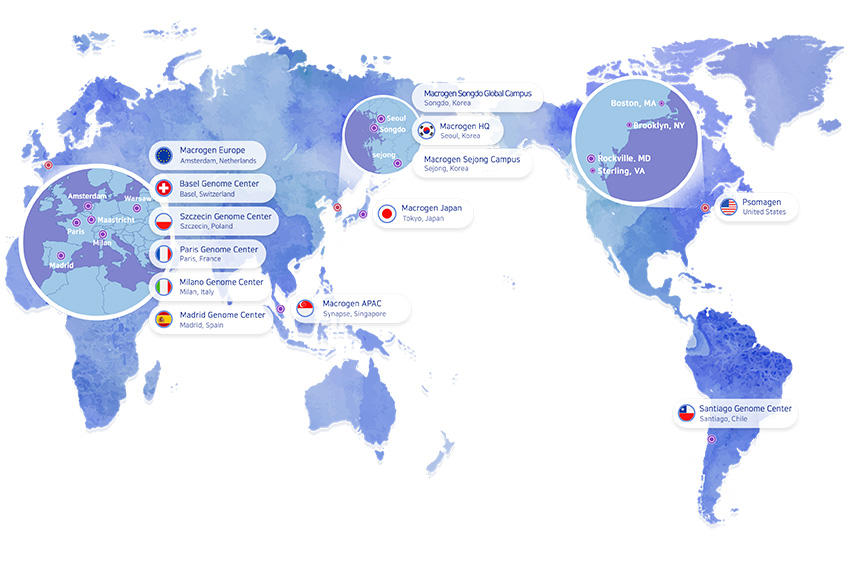While genomics has historically faced high costs and a limited market, Macrogen has invested in cutting-edge genome sequencing equipment to meet the growing demand from medical institutions.

Established in 1997, Macrogen has pioneered genome sequencing and testing in Korea, becoming a reference company and supporting the development of technology in the country. However, it would be wrong to limit Macrogen's role to only Korea, as the company aims to accelerate genomics access for institutions, researchers, and individuals all around the world. Can you run through the latest evolution of Macrogen? What is your position in the genomic industry?
Initially, we focused on providing genetic services to keep pace with the rapidly advancing technology. We invested in machinery and followed technological developments closely. However, the technology has now reached a more stable phase. Consequently, we are transitioning to a second stage where our aim is to offer genetic blueprints at a very low cost.
As Jacques Monod noted, every living creature possesses its own genetic blueprint. We envision using these genetic blueprints as a kind of GPS navigator to guide future advancements. This vision is driving the launch of GenTok, our latest initiative. Within the next three to five years, we aim to serve more than 10 million people with our genetic services. This ambitious objective underscores our commitment to making genomic information accessible and affordable on a global scale.

GenTok
The advancements in genomics technology over the past decade have been remarkable. Macrogen has invested in the latest equipment and collaborated with technology partners such as Illumina, Ultima, and PacBio to introduce the latest sequencing systems. Could you explain in detail about Macrogen's global technology partnership network and how it enhances technological competitiveness?
Whenever new devices like NovaSeq X, Revio, or UG100 hit the market, we are usually the first to get them— sometimes even before anyone else in Asia or the world. When we bring in cutting-edge tech like Illumina's NovaSeq X at our Korea headquarters, we set the gold standard, sharing these tech advantages with our subsidiaries and affiliates in Japan, the APAC region, Europe, the USA, and Chile. This approach creates a big tech gap between us and our competitors. Plus, our global branches work directly with local partners like Illumina for practical stuff like logistics and equipment maintenance.
Our quick adoption of new tech and focus on R&D keeps us at the forefront of the global precision medicine market. We’re always ready to roll with market changes, launching innovative products and services that strengthen our leadership position.
Our strength lies in mastering and using the latest technologies. Take Illumina's NGS technology, for example. It's the global standard for genome analysis, and by using Illumina’s latest equipment, we deliver super precise, fast genome analysis. This gives us a major edge in big projects or complex genome data analysis. PacBio’s long-read sequencing tech is another tool in our kit, allowing us to read longer DNA sequences accurately. This is key for analyzing complex genome phenomena like structural variations and gene rearrangements.
Ultima’s sequencing technology focuses on cutting costs and speeding up analysis, making genome analysis more accessible. With these tools, we offer economical and efficient genome analysis services. We have the flexibility to provide tailored solutions—using Illumina's NGS for some studies and PacBio’s long-read sequencing for others, depending on what’s needed. This versatility allows us to meet both research and commercial demands.
Through these tech partnerships, we offer top-notch analysis services in areas like rare disease diagnosis, cancer genome analysis, and personalized medicine. This boosts our technological edge in the market.
We also dominate the single-cell analysis market thanks to our collaboration with 10x Genomics, which has strengthened its ties with global pharmaceutical companies and major hospitals. This partnership has expanded our influence in the global healthcare market, providing solutions for drug development and precision clinical diagnosis. With these global partnerships, we continue to roll out new technologies and develop innovative services, solidifying our leadership in the market.

Macrogen Songdo Global Campus
Songdo Bio Cluster has established itself as the largest production cluster with 70 companies gathered there. Therefore, it is not surprising that Macrogen has decided to relocate its historic genome center and invest in a new global genome center in Songdo. How will this investment support more opportunities and help secure global market share? How do you expect this new center to increase competitiveness and become the first "genome foundry"?
Biotech companies are flocking to Songdo because it's shaping up to be the next big thing in the biocluster world. This area is home to top-tier biotech firms recognized globally. Plus, Songdo’s status as an economic free zone means it offers great tax benefits, making it easier to attract investment. Its location is also perfect for the export and import of bio raw materials. With universities and research institutions already in place, the research infrastructure is strong, too.
“Macrogen's Songdo Global Campus” (Genome Center) started construction in April and is set to be the largest genome big data hub in Asia by early 2026. With the growing global demand for genetic analysis, we are expanding to Songdo to tap into top talent and keep up with the fast-paced genome market. The center will span about 18,800 square meters and include eight floors above ground, located in the Songdo Advanced Industry Cluster.
The new Songdo center will take over operations from the Seoul-based Macrogen Gasan Genome Center. New facilities will include a platform development center for medical and healthcare integration, logistics management, and employee welfare spaces, boosting both functionality and employee satisfaction.
This center is designed to be a global genome big data hub, driving digital transformation in healthcare by combining genome data with AI. It’s also planned as a "genome foundry," streamlining and speeding up the entire genome business value chain. With enhanced production capacity and cost reductions through automation, we aim to boost competitiveness not just in Korea, but worldwide. By merging genome data with AI, the center will push forward personalized precision medicine and strengthen its standing in the global market.
In June, we became the first non-medical institution in Korea to get the green light from the Korea Disease Control and Prevention Agency to set up a biobank. Following in the footsteps of the UK’s “UK Bioban,” the USA’s “All of Us,” and Finland’s 'FinnGen,' we also plan to establish a Korean biobank. This biobank will play a key role in advancing precision medicine research and supporting the bio/digital health industry by providing high-quality samples for clinical research worldwide. Furthermore, “Macrogen Sejong Campus” is also expected to be completed within this year and, along with the Songdo Global Campus, will serve as a key hub for big data and AI-driven digital healthcare business.
Could you explain Macrogen's global strategy?
We have had our sights set on the global market from day one. As of 2023, about half of our revenue comes from overseas sales. We’re steadily expanding our global reach, focusing on subsidiaries in Japan (since 2007), Europe (2017), Singapore (2018), Spain (2016), and Chile (2022). Other regions like Latin America, Asia, Oceania, and the Middle East are directly managed by our headquarters.
In Europe, we are making big moves by expanding its network of "Genome Supermarkets" across the continent. With a central hub in Amsterdam, we’ve recently spread into Belgium, Italy, France, Poland, Switzerland, the UK, and Germany. Europe is the world’s second-largest market, and it's growing fast, thanks to strong local demand and brand recognition.
Right now, we are focusing on shifting from treatment to prevention and expanding the use of genetic analysis. We’ve got nearly 30 years of experience, know-how, and data in genome analysis, which gives us a big edge. By getting top-tier data processing equipment first, we offer faster, more accurate test results at better prices than our competition. From the start, we have poured resources into R&D for cutting-edge technologies like NGS, building a team of genome analysis experts and investing in advanced equipment to boost our tech edge.
We also built strong networks both at home and abroad, boosting our influence in international markets. Thanks to this global network, we have over 20,000 research institution customers in more than 160 countries and have served over 500,000 individual genetic test users.
Details of the Headquarters’ Overseas Strategies:
We see huge potential in the global genome analysis market and is expanding our market share with region-specific strategies to become the top player worldwide. In regions like Latin America, the Middle East, Asia, and Oceania, we plan to strengthen our leadership by tailoring solutions to local needs. This includes boosting local partnerships, working with major research and medical institutions, and pushing forward with joint research projects to advance genome analysis technologies.
We also plan to offer training programs to local researchers and medical professionals to spread knowledge and technology. We’re developing customized genome analysis solutions that consider each region’s unique genetic traits and environmental factors. Our headquarters are ramping up support for each subsidiary, acting as a global control tower to boost competitiveness. This includes setting up sales offices to expand influence in target countries and increasing local hiring. Our goal is to establish a strong presence in local markets through branches or subsidiaries.
The global genome analysis market is growing fast, driven by the rising importance of genome technologies in personalized medicine, disease prediction, prevention, and new drug development. Major genome research projects are happening all over the world, fueling market growth. Our headquarters oversees key regions like Latin America, the Middle East, Asia, and Oceania, where genome analysis has high potential due to unique genetic and environmental factors. These areas are crucial for identifying disease causes and developing tailored treatments.
Governments and major medical institutions in these regions are ramping up investments in genome research, further boosting the market’s growth potential.

Global Network
Talking more specifically about the US and Europe, what potential do you see for Macrogen in these regions?
Initially, we expect to see good results in Korea and, almost simultaneously, in Japan. We have a strong reputation as sequencing technology experts locally, and our prices are competitive as well. Following that, we will focus on Europe, including Madrid, and then target the US market, which is very large. If we have sufficient financial resources, we might seek a partner to enter the US market. Additionally, we have the Macrogen APAC office in Singapore, where we will assist Asian countries in building precision medicine systems.
Europe is a particularly interesting region for me. Each nation has its own unique characteristics, with diverse cultures and vibes in each city. Moreover, many cities are home to large, well-established hospitals. My aim is to provide our genomic data to these major hospitals and integrate it for precision medicine. Macrogen is what I call a "genome supermarket," establishing genome centers in each city. This network of centers will support our goal of advancing precision medicine by making genomic data more accessible and usable across different regions.
Macrogen recorded strong sales in 2023 with 130 billion KRW, driven by the growth of its offerings. On one side, the improvement and cost-efficiency of the healthcare industry is set to continue growing in the future. On the other side, as the B2C market and direct-to-consumer business are predicted to reach USD 2.5 billion within the next few years, the launch of your B2C platform is set to accelerate your company's growth. Looking at the next 3 to 5 years, how do you foresee the growth of Macrogen? What would be the challenges, and how do you plan to overcome them?
Macrogen is performing very well in the research market, also participating in government-led initiatives. That forms the foundation of our business. Our target is the Personal Genome Project, and I aim to reduce the cost so that all 8 billion people around the world can use our personal genome tester. The goal is to provide everyone with their genetic blueprint in their pocket. Initially, our objective is to reach 10 million people, and then expand to 500 million within 10 years.
We may also collaborate with large global companies, which presents another opportunity for Macrogen. Specifically, we aim to assist Asian governments in implementing precision medicine using genomic data. Currently, the Korean government provides Official Development Assistance (ODA). By aligning with government initiatives, we can expand overseas and offer genomic medical systems. With this information, individuals can avoid future diseases, and we are committed to helping underprivileged communities achieve this.
In the next 3 to 5 years, we foresee significant growth for Macrogen. However, we will face challenges such as maintaining data privacy, ensuring cost-efficiency, and navigating regulatory landscapes. To overcome these, we will continue to invest in technology, foster strategic partnerships, and advocate for policies that support the ethical use of genomics.
For more details, explore their website at: https://www.macrogen.com/en/main
0 COMMENTS